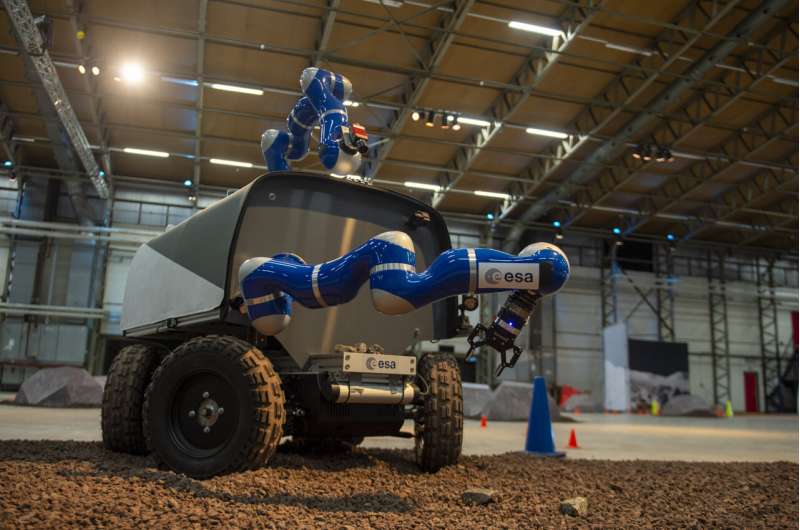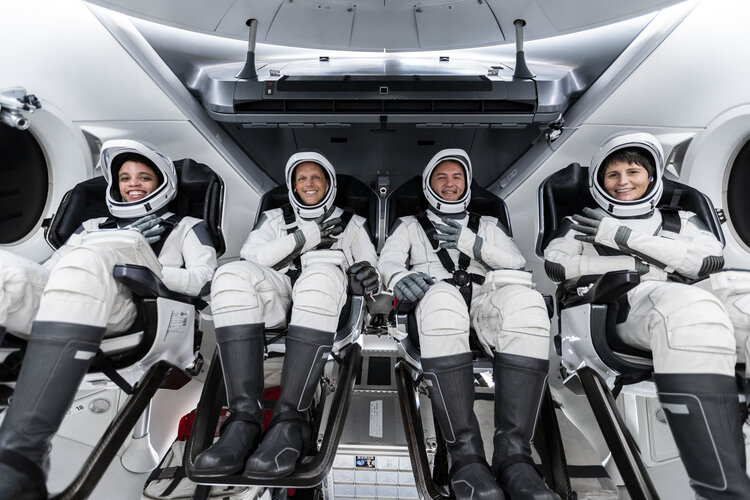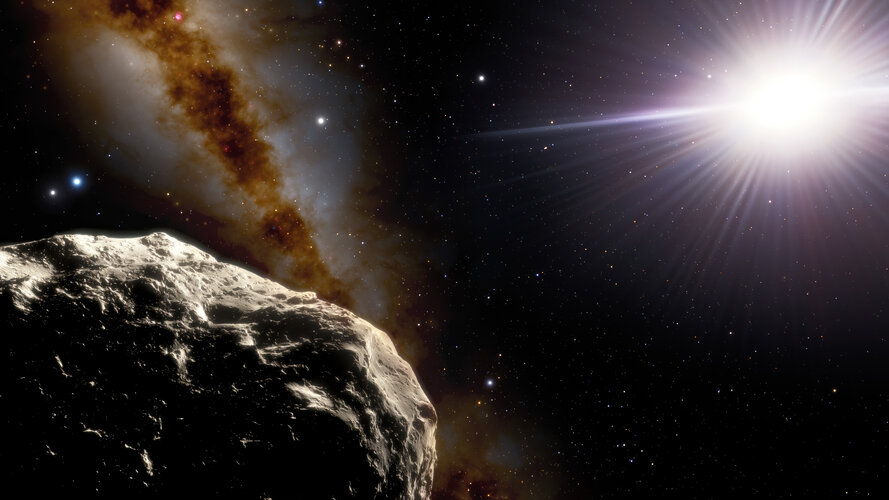
Copernical Team
In simulated mission, astronauts obtained direct haptic feedback from robots they control on the ground

Astronauts in orbit could soon be using robots to explore lunar or planetary surfaces without having to expose themselves to the dangers of the extraterrestrial environment. A paper by Kjetil Wormnes and his colleagues based at the European Space Agency (ESA), Noordwijk, The Netherlands, published in the De Gruyter journal Open Astronomy, presents a simulated geological exploration mission in which, for the first time,astronauts in the International Space Station obtained direct haptic feedback from robots that they control on the ground, "feeling" objects that they manipulate.
Human interplanetary exploration is inspirational but it is still, largely, the stuff of science fiction; it is almost 50 years since somebody last set foot on the moon, and crewed expeditions beyond our satellite are still decades away.
During the last half-century, however, many missions have taken robots to planetary surfaces, and they can operate in conditions that are far too hostile for human astronauts, but they need direct human control if they are to undertake complex missions.
Looking four-ward to launch
 Image:
Image:
ESA astronaut Samantha Cristoforetti is all smiles alongside her Crew-4 mates during a training session at SpaceX headquarters in Hawthorne, California, USA.
Samantha is the next ESA astronaut to fly to space and is expected to be launched to the International Space Station in spring 2022. This is the second mission for Samantha who spent approximately 200 days in space in 2015 for her Futura mission.
Samantha is launching with familiar faces. Fellow mission specialist Jessica Watkins was part of NASA’s NEEMO 23 crew, in which Samantha served as commander. The team spent 10 days living and working
Apply now for the 2022 YGT opportunities!

The 2022 ESA YGT opportunities are now open for applications. Positions are available in engineering, science, IT and business services. Find out more and apply now.
Newly discovered asteroid just second of its kind

You may have heard of the Trojans, two vast swarms of asteroids that lead and trail Jupiter on its orbit around the Sun.
But the king of the planets doesn’t hold a monopoly on Trojan asteroids. The physics that gives rise to the formation of these distinctive collections of ancient rocks is the same for all planets – including Earth.
While the existence of Earth Trojans had been theorised for many years, the first direct observation of one was confirmed just over a decade ago. Since then, no second Earth Trojan
NASA Planes Fly into Snowstorms to Study Snowfall
 Scientists repeatedly check the weather forecasts as they prepare aircraft for flight and perform last-minute checks on science instruments. There's a large winter storm rolling in, but that's exactly what these storm-chasing scientists are hoping for.
The team is tracking storms across the Midwest and Eastern United States in two NASA planes equipped with scientific instruments to help un
Scientists repeatedly check the weather forecasts as they prepare aircraft for flight and perform last-minute checks on science instruments. There's a large winter storm rolling in, but that's exactly what these storm-chasing scientists are hoping for.
The team is tracking storms across the Midwest and Eastern United States in two NASA planes equipped with scientific instruments to help un Kendall Outlines 'Operational Imperatives,' Choices During Think Tank Appearance
 While the United States military remains "the best in the world," Department of the Air Force Secretary Frank Kendall said Jan. 19 that the Air and Space Forces must move quickly to adapt and modernize to offset actions by China and others that have dented the "presumption of superiority" held by the U.S.
Kendall offered the assessment during a 45-minute "virtual fireside chat" sponsored b
While the United States military remains "the best in the world," Department of the Air Force Secretary Frank Kendall said Jan. 19 that the Air and Space Forces must move quickly to adapt and modernize to offset actions by China and others that have dented the "presumption of superiority" held by the U.S.
Kendall offered the assessment during a 45-minute "virtual fireside chat" sponsored b In space race, Europe faces choice: passenger or pilot
 As the race to send people to the Moon and beyond heats up, Europe faces calls to make a choice: Keep paying for seats on spacecraft or finally fly its own manned vehicle.
Imagine if Christopher Columbus did not have a ship to sail to the Americas, the head of the European Space Agency said recently, lamenting that the continent lacked a vessel to "explore the next frontier".
"We wil
As the race to send people to the Moon and beyond heats up, Europe faces calls to make a choice: Keep paying for seats on spacecraft or finally fly its own manned vehicle.
Imagine if Christopher Columbus did not have a ship to sail to the Americas, the head of the European Space Agency said recently, lamenting that the continent lacked a vessel to "explore the next frontier".
"We wil How NASA in Silicon Valley will use Webb Telescope to study distant worlds
 NASA's James Webb Space Telescope is getting ready to give us the best view yet of worlds beyond our own solar system, commonly known as exoplanets. Scientists at NASA's Ames Research Center in California's Silicon Valley will be among the first to observe the cosmos with Webb, and they're looking for clues about how exoplanets form, what they're made of, and whether any could be potentially hab
NASA's James Webb Space Telescope is getting ready to give us the best view yet of worlds beyond our own solar system, commonly known as exoplanets. Scientists at NASA's Ames Research Center in California's Silicon Valley will be among the first to observe the cosmos with Webb, and they're looking for clues about how exoplanets form, what they're made of, and whether any could be potentially hab ESA determines new 'space time'
 Since November 2021, ESA's satellites and ground stations have been running on a newly defined, incredibly precise "ESOC time". Measured by two atomic clocks in the basement of the ESOC mission control centre in Germany, this new time determination will bring wide-reaching operational benefits for all ESA missions, making new feats possible in space while adding to our global definition of 'now'
Since November 2021, ESA's satellites and ground stations have been running on a newly defined, incredibly precise "ESOC time". Measured by two atomic clocks in the basement of the ESOC mission control centre in Germany, this new time determination will bring wide-reaching operational benefits for all ESA missions, making new feats possible in space while adding to our global definition of 'now' What the rise of oxygen on early Earth tells us about life on other planets
 When did the Earth reach oxygen levels sufficient to support animal life? Researchers from McGill University have discovered that a rise in oxygen levels occurred in step with the evolution and expansion of complex, eukaryotic ecosystems. Their findings represent the strongest evidence to date that extremely low oxygen levels exerted an important limitation on evolution for billions of years.
When did the Earth reach oxygen levels sufficient to support animal life? Researchers from McGill University have discovered that a rise in oxygen levels occurred in step with the evolution and expansion of complex, eukaryotic ecosystems. Their findings represent the strongest evidence to date that extremely low oxygen levels exerted an important limitation on evolution for billions of years. 